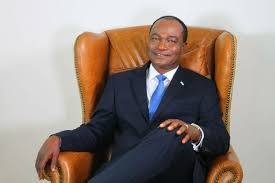Change of Behavior, not Attitude, is what Sierra Leone Really Needs
Humans are influenced by watching the behavior of others; Dr. Albert Bandura would quickly and accurately tell you that! So is the Presidential or governmental call for “attitudinal change” adequate by itself to bring the required positive results that the people of Sierra Leone yearn? Should we dare to look closer at the vision to see if the ladder is propped up against the right wall? These are the kinds of questions being raised by the author in this article. And based on his limited research, he offers a different approach to help the government of Sierra Leone change their country and her people for the better, forever…
For several years now Sierra Leoneans have heard and commented on a change of mindset, mentality, attitude, way of life, way of thinking, etc. However, according to a recently-read article by a compatriot in the UK: “… for the first time in the history of Sierra Leone, a government has made “Attitudinal change” a political philosophy.”
That is fair enough, because in spite of all the past talk about changing the mindset, mentality, attitude, way of life, way of thinking, etc., this is the first time I can remember that a concerted effort is being made at this level as reflected in the current national brouhaha over the new buzz phrase.
We applaud the President for his vision, regardless of the approach that has been employed thus far, because overall it is striking. However, like zero tolerance for corruption, which already has been bruised by some activities within the new government and that have still not been transparently settled, we hope the sexy term “attitudinal change” goes over and beyond being just that (smile).
To be able to influence anyone (including your own teenage children) requires more than just mere words coming from a parent. Similarly, a nation cannot just rely on words coming from a President irrespective of the type of fanfare that surrounds it. And we trust the President means well, but the approach toward “attitudinal change” to date is, in my humble opinion, not sound.
What is specifically questioned in this article is whether the “philosophy” itself is the solution to bringing positive change to the country. Should it not be based more on the way Sierra Leoneans behave as opposed to what their attitude is? Do we even know why Sierra Leoneans behave they way they do?
We must not confuse attitude with behavior as the first line of reasoning otherwise we run the risk of confusing efforts with results. To change one’s attitude by itself is not enough to bring the kind of country-impacting change being sought, or that is necessary. Like one of my friends told me over a phone conversation “people can change their attitude but do not believe in, or accept, it.” So why not focus on results, which are directly linked to our behaviors, and can be measured?
One can simply question the measurement of a change in attitude as it is as intangible as ever. Or is it being used as a synonym for behavior? Obviously then the phrase “attitudinal change” needs to be defined and established. What we understand it to be is that we expect people to change their attitude towards one another and towards our country. Like flipping a switch, for example! But what are the results from doing so? How can we gather and interpret them, for instance?
The solution, we believe, and what we think the President and his government should be calling for, rests in the change of our vital behaviors towards not necessarily everything, but the most critical ones. It has been proven over and over again that to change the world we have to change our behavior — our vital behaviors, i.e., let us now look at vicarious examples of these two short real life stories below:
In 1986, Dr. Donald Hopkins and his team at the Carter Center in Atlanta declared war on the Guinea worm disease because he knew that if 120 million people in 23,000 villages would change just a few vital behaviors for just one year, there would never be another case of the infection. He and his colleagues laid claim to something never before accomplished in human history. They annihilated the disease. In Sierra Leone if we can change one self-defeating behavior, what would that be? How many lives would be saved every year from hygiene-related death, if only we employ certain simple but purposeful behavior(s), for example?
Meet Dr. Wiwat Rojanapithayakom (okay just call him Dr. Wiwat as he is known around the world). By 1993 an estimated 1 million Thais (people from Thailand) were infected with HIV. Health experts worldwide predicted that in just a few years Thailand would lead the world in infections per capita – with as many as one in four adults (a whopping twenty-five percent of the adult population) carrying the virus. His training taught him to make the public aware of the threat that diseases thrive in ignorance, therefore, you have to spread the word. They distributed posters, held education sessions, convinced celebrities to broadcast television and radio spots, but all failed miserably.
After continuing his search for a solution, he found out that 97% of all new cases were coming from heterosexual activities and not the intravenous route from where it really started. Wiwat surmised that if he could persuade 100 percent of the country’s sex workers (150,000 in Thailand at that time and Thai men periodically visit brothels – a way of life there) he would make a difference. So his primary strategy now became to persuade every single sex worker to demand the use of condoms from their clients. He got them to comply with the condom code and much to the surprise of the world’s epidemiologists, Wiwat’s plan worked. The lesson is that by carefully searching for and targeting a vital behavior, Wiwat was able to make a difference in the lives of millions of Thais.
There are several other examples, like Dr. Ethan Reid, Dr. Silbert, Yunnus of Grameen Bank, etc. that show the results of implementing life- and world-changing behaviors. But as exemplified in the Wiwat story especially, it takes time, skill, hard work with lots of research and analysis by the right experts to accomplish these things.
Changing behavior is not merely about talking to youth men and women, or adults, in fancy seminars or hanging around street corners in Sierra Leone to tell people to change their attitude. It is about first understanding what it is that we really want to do. Then we have to get the understanding that this type of work is arduous but not insurmountable, and is a long drawn out process, not a quick fix.
Therefore, dedicating the appropriate resources and employing the necessary skills set, which are largely external to Sierra Leone and Sierra Leoneans, is a huge part of the puzzle. Setting clear goals of what vital behavior(s) need change, obviously after plowing through the relevant data, and executing on those goals is going to be imperative to the campaign’s success.
Most importantly, it will be about leading by example. How powerfully our behavior is shaped by observing others! With that said, it becomes important that our leaders practice what they preach by showing us their own different attitude and behavior especially, themselves. Changing the stifling norm of dealing negatively and sometimes aggressively with press reports, for example, will show the people of Sierra Leone that they mean business. Why can’t our leaders just say Mr. or Ms. Reporter you got it all wrong and here is the truth; then produce the evidence to rebut whatever allegations, transparently? Does that show a positive change in attitude… oh, I mean behavior?
A change of attitude is a means to the end and not the end itself. Sierra Leone can quickly change if certain vital and national behaviors are changed. Attitude is only one agent of accomplishing behavioral change. Hope we can re-visit the thought process described here, so we bark at the right tree, so to speak, in this all-important and very necessary change. In the best interest of Sierra Leone and her people!
Conclusion:
First of all it is going to take a lot more than the right combination of words to influence a nation to change their attitude, or rather, behavior. Secondly, changing the attitude of a nation itself is not nearly enough because it does not show results of substance, and it is hardly measurable, if at all. How would you measure a change of attitude not accompanied by a change of behavior among the youth for example? Finally, we should focus more in a change (or changes) of behavior. If you want to change Sierra Leone, you eventually have to change the way people behave, and not necessarily their attitude. Good attitude, however you choose to measure it, is all for naught without the right behaviors. And experts have proven the behavior factor over and over again with world-impacting results. This is critical information.
Dedication
This article is dedicated to the people of Sierra Leone, in that some other viewpoint was launched at the same time the phrase “attitudinal change” crept into their lives. We know that there is a growing body of knowledge as well as an impressive supply of real-life success stories that teach exactly how to change almost any human behavior. But it is important to diagnose before you prescribe. And then deploy the right resources.
The intent is to provide an alternative thought to the appropriate people based on what the experts in this area of study have proven for decades that a change in behavior, not attitude, is the key to changing the world. Now we cannot say that we did not know…
Source: Influencer, the Power to Change Anything; Patterson, Grenny, Maxfield, McMillan and Switzler. This book was the only source used as reference to write this article and some words, phrases and sentences are reproduced verbatim.
Part 2 will be a solutions-oriented synopsis of some of the things we think can be done to help bring about a constructive change in behavior (not attitude).
by Amadu Massally
The author, Amadu Massally is an accountant and information systems auditor based in Dallas, TX. He is currently President of the Sierra Leone Network and Chairman of the Sierra Leone-Gullah Heritage Association. He is also one of the chief proponents of the new Sierra Leone Council of Representatives (SALCORE), an organizations of twenty-plus Sierra Leone organizations, and growing, working together toward national development from the US, primarily.
Stay with Sierra Express Media, for your trusted place in news!
© 2011, https:. All rights reserved.







Abdul R. Kabia
/
This is indeed a thought provoking piece. I cannot agree more that to chang the way of thinking of the people is rather a daunting challenge or perhaps even an impossible task to carry out.But peoples`behaviour can be changed if the right approach is put in place.
14th February 2011Joseph Grenny
/
Amadu,
14th February 2011I could not have articulated the criticism nor the advice better than you have. Tackling a culture of corruption is not about attitude, but about concrete behavior, and requires a serious approach engaging all six of the sources of influence that shape behavior. I hope your article influences those in policy positions to step up to that level of strategy that we’ve seen create profound change across the world.
Joseph Grenny – co-author, Influencer: The Power to Change Anything